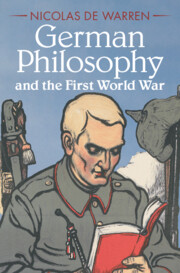
- Cited by 8
-
Cited byCrossref Citations
This Book has been cited by the following publications. This list is generated based on data provided by Crossref.
de Warren, Nicolas 2022. The Existential Husserl. Vol. 120, Issue. , p. 65.
De Santis, Daniele 2023. Transcendental Idealism and Metaphysics. Vol. 126, Issue. , p. 159.
de Warren, Nicolas 2023. Varieties of Self-Awareness. Vol. 121, Issue. , p. 27.
Geniusas, Saulius 2023. Destiny, Love and Rational Faith in Husserl’s Post World War I Ethics. Human Studies, Vol. 46, Issue. 3, p. 443.
Rajan 2024. Trajectory of Swaraj and the Background Philosophy of Anti-colonial Solidarity: A Discourse on the Indian Agents of Change. Journal of Dharma Studies,
Shi, Yuanping 2024. How Can Humans Attain a Harmonious Cosmic Order? Max Scheler’s Insights into Religious Experience in the Middle Period. Religions, Vol. 15, Issue. 10, p. 1248.
de Warren, Nicolas 2024. The Palgrave Handbook of Philosophy and Money. p. 425.
Amini, Babak and Kemple, Thomas 2024. Introduction: Social theorists and the First World War. Journal of Classical Sociology, Vol. 24, Issue. 4, p. 307.
- Publisher:
- Cambridge University Press
- Online publication date:
- March 2023
- Print publication year:
- 2023
- Online ISBN:
- 9781108526180


